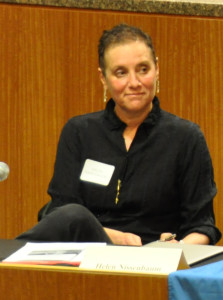Summary of Helen Nissenbaum’s presentation in a panel on “Disclosure and Notice Practices in Private Data Collection” at Data Privacy & Transparency in Private and Government Data, April 4, 2014 at Benjamin N. Cardozo School of Law.

Notice and consent might be a solution to some problems, but Helen Nissenbaum doesn’t think it is the solution to the privacy problem.
Consent is at the heart of so much privacy litigation. Nissenbaum, Director of the Information Law Institute and a Professor of Media, Culture and Communication, and Computer Science at New York University, explains that many of the issues that arise from consent stem from the fact that there is a huge blur between consent and coercion, as there is so much trouble when it comes to understanding and implementing. Websites that have privacy policies that state “be sure to return to this page to make sure you have the most current version of this policy,” simply highlight how much these policies are being ignored. The fact is, many companies don’t even need you to consent to much of the data that they collecting.
In a way, Nissenbaum points out, notice and consent is really a sham. She thinks we waste entirely too much time focusing on notice and not enough time thinking about the ways to actually limit data collection. Once this data collection is limited to areas in which such data is really needed, then we can aim to retrieve real, meaningful consent.
For more from this panel, click here.




[…] Helen Nissenbaum – “Notice and Consent is a Sham” […]